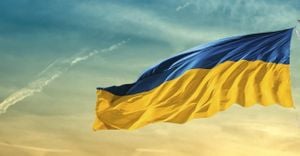Germany's recent elections have underscored the nation's pivotal role within Europe, particularly as the continent grapples with the looming shadow of Russia's aggression. The post-election narrative is driven by a significant electoral win for the democratic center, laying down clear interest among Germans to support Ukraine and bolster European solidarity. The message from the ballot box could not be clearer.
Following the election, the likely next Chancellor, Friedrich Merz, articulated the need for Germany to achieve independence from U.S. influence, particularly against the backdrop of insufficient American commitment to European security. "My absolute priority will be to strengthen Europe as quickly as possible so we can really achieve independence from the USA," Merz stated, signaling his intentions to reshape German and European policy toward greater self-reliance. This marks a substantial shift as Germany finds itself needing to act decisively amid growing economic and security pressures.
Merz's coalition, dominated by the Christian Democrats, faced disappointing election results, capturing only 28.6% of votes, their second-worst outcome since World War II. The far-right Alternative for Germany party significantly increased its share to 20.8%. This political dynamic strengthens the urgency for Merz to address the rising threats posed by both far-right and far-left parties, who could potentially hinder necessary reforms aimed at enhancing defense spending and economic recovery.
Meanwhile, leaders within the European arena are issuing calls for unity against Russian aggression. One prominent voice has been German Foreign Minister Annalena Baerbock, who firmly rejected the narrative of negotiating peace without Ukrainian involvement. "No meaningful negotiation without Ukraine. Peace cannot be bullied; it must be won collectively," she affirmed, pushing for enhanced military support for Ukraine. With Europe having provided 135 billion euros to back Ukraine, Baerbock’s declarations resonate strongly with the collective European resolve to uphold peace and security across the region.
Baerbock's passionate appeal highlights the prevailing sentiment following the three-year mark of the war: "It is Russia who started this war… and as Europeans, we must stand firm for our principles and support Ukraine's fight for freedom." This reflective look at recent history serves as both motivation and warning; how Europe responds now could have historical repercussions.
Merz's election announcement emphasized the urgency of the situation he collectively faces with the new German government. With public sentiment clearly favoring democratic principles and support for Ukraine, the stakes couldn't be higher. He characterized the situation as "five minutes to midnight" for Europe, indicating the immediacy of Security challenges linked with rising populist sentiments.
The German electorate's commitment to the democratic center indicates widespread support for the principles of the European Union. This is significant, as respondents to recent polls indicated not only awareness of Russia's intent to disrupt European democracies but also solidarity with Ukraine as the embodiment of those democratic aspirations.
Critically, the pressure is mounting on the new German leadership to act quickly and decisively. The stakes revolve around defense spending and international cooperation as Europe seeks to present itself as unified against external threats. The current political trends could evolve to make it increasingly difficult for any government to shift focus from these pressing issues without courting public dissent.
With economic growth stagnation compounding security fears, Merz's focus on fostering independence from Washington must be balanced against the necessity for continued transatlantic cooperation, particularly as decisions made by the U.S. under the new political climate could have immediate repercussions for European security.
Europe is on the precipice of its most challenging period since World War II. Responses to Russian actions will set the tone for not only regional but global stability. Germany's leaders are well aware of their responsibilities. A principled stance supporting Ukraine, underscored by decisive action from the new government, remains imperative as Europe drives forward, united against the resurgent forces of authoritarianism.
From this electoral moment, it is clear: Germany must solidify its partnership with Ukraine, embodying the values of freedom and democracy it steadfastly champions. Current political leaders must navigate these rocky waters expertly to secure both national interests and the broader European cause.
Germany is steadfastly positioned as both the economic engine of Europe and the linchpin of its security system. The next few months will undoubtedly determine how Germany balances its commitments domestically with its role internationally, particularly for the enduring battle for peace and security on the European continent.



